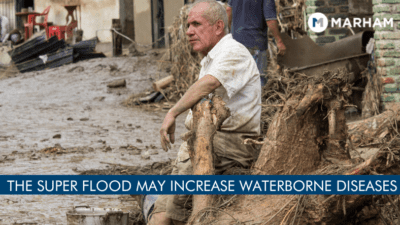Waterborne disease is the one caused by drinking or using contaminated water with disease-causing microbes or pathogens. Since Pakistan is facing a super flood that has covered more than 70% of the country there is a high threat of the spread of these diseases.
The UN estimates that the floods has affected over 33 million Pakistanis, or one in every seven people, with over 500,000 homes destroyed or damaged. – Report by BBC
What is a Waterborne Disease?
Waterborne diseases are conditions caused by microscopic organisms such as viruses and bacteria that enter the body through polluted water or contact with excrement.
Transmission of these viruses happens when people consume contaminated water, prepare meals, and wash their clothes, among other things. Many developing nations lack adequate water treatment plants, particularly in rural regions.
According to a report from 2017:
“In Pakistan, about 50% of diseases and 40% of deaths occur due to poor drinking water quality reported in community health studies.”
Waterborne Disease Meaning in Urdu:
پانی سے پیدا ہونے والی بیماریاں ایسی حالتیں ہیں جو خوردبینی جانداروں جیسے وائرس اور بیکٹیریا کی وجہ سے ہوتی ہیں جو آلودہ پانی یا اخراج کے ساتھ رابطے کے ذریعے جسم میں داخل ہوتے ہیں۔
The link between Flood and Waterborne Diseases:
“Floods are one of the natural calamities that occur across the world and have a wide variety of health consequences. They can enhance the transfer of various infectious illnesses,” says a study on possible viral infections in flood disasters.
Waterborne Disease List:
Some of the most common types of the waterborne disease include the following:
- Polio
- Malaria
- Cholera
- Dengue
- Typhoid
- Anemia
- Botulism
- Fluorosis
- Trachoma
- Hepatitis
- Diarrhea
- Scabies
There are many other waterborne diseases but they are relatively less common in Pakistan. But, people can be infected with other waterborne diseases on rare occasions.
Waterborne Disease Symptoms:
While every waterborne disease has its own symptoms that can vary from person to person, some of the common ones are:
- High fever
- Muscle pain
- Weakness
- Stomach ache
- Vomiting
- Loose motions
- Nausea
- Fatigue
- Belching wind
- Cramps
- Weight loss
- Bloating
- Abdominal pain
It is important to see a doctor if you or someone you know has these symptoms. Click here to see an online doctor now via Marham.
Waterborne Disease Prevention:
Some of the necessary precautions that we all must take to avoid waterborne diseases are:
- Only drink clean water: Drink only clean and safe water, either from a portable source or from a water purifier. It should be visually clean and devoid of sand and silt. You can filter the water to remove any visible dirt.
- Clean your water filters often: Regularly service and maintain water purification systems such as filters, RO units, and so on. Make sure the water you’re storing is germ-free.
- Use clean water for showering: In doubtful-looking bathing water, add antibacterial liquid such as Dettol.
- Keep your hands clean: Hand hygiene entails washing hands with soap after arriving home, using the restroom, preparing food, and eating or drinking anything.
- Eat clean and fully cooked food: Avoid consuming stale cooked food and unrefrigerated food that has been exposed to the elements for an extended period of time.
- Get Vaccinated: Take immunizations to protect yourself against avoidable diseases such as Typhoid, Hepatitis A, Polio, and others.
“Sanitation, hygiene, nutrition, water and shelter providing are the immediate public health response in flooding but there must be a plan for decreasing morbidity and mortality related to flood disasters,” says research.
In this hard time, the Ministry of Health and the Government of Pakistan should also take action to prevent waterborne diseases. It can save the lives of many people struck by this disaster.
Read Also: Waterborne Diseases Karachites Are Facing

